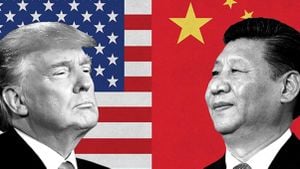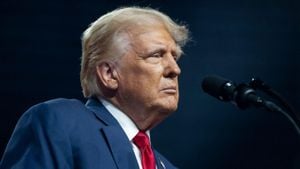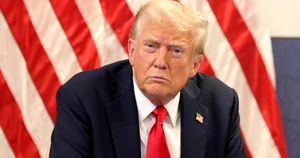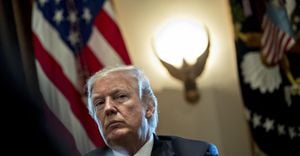Donald Trump is back with another bold plan, and this time it's all about tariffs. His proposal to impose hefty levies on imports from Mexico, Canada, and China has sent ripples through global markets, causing currencies to wobble and raising eyebrows among economists worldwide.
Specifically, Trump announced plans for a 25 percent tariff on all products sourced from Canada and Mexico, and slapped on a 10 percent duty for goods coming from China. He justified these drastic steps by linking them to broader issues like illegal immigration and drug trafficking, particularly the alarming flow of fentanyl entering the United States.
The reaction was almost immediate. The Canadian dollar stumbled by 0.9 percent against its U.S. counterpart, marking its lowest point against the dollar since 2020. Meanwhile, the Mexican peso took even harsher hits, with values dropping by 1.3 percent, exacerbated by its already declining trend. China's renminbi also skidded down, with losses of 0.1 percent as market players absorbed the news.
"Stiff new tariffs on imports from the U.S.'s three largest trading partners would significantly increase costs and disrupt business across all economies involved," warned Erica York, an economist at the Tax Foundation. Her cautionary message encapsulates the overarching concern among many economists: how will consumers and businesses cope with these sudden cost increases?
For everyday shoppers, the pinch could be palpable. A recent [report](https://www.techspot.com/news/105205-economists-warn-trump-tariffs-could-cause-tech-prices.html) by the Consumer Technology Association suggests dramatic price hikes across various sectors. For example, they predict laptop prices could increase by up to 45 percent—a nearly $400 bump on models currently priced at around $793. Premium laptops might see even steeper rises, adding close to $450 for every $1,000 they already cost.
Smartphones aren't escaping the turmoil either; with expected increases nearing 25.8 percent. Monitors could rise about 31.2 percent, making the tech sector particularly vulnerable. Experts fear such sweeping tariffs could tip the scales toward higher consumer prices as the economy traverses these troubled waters.
But it’s not just consumers who are at risk. The corporate world is bracing for potential upheaval as businesses weigh the costs of these tariffs. Production and supply chains, especially within integrated sectors like automotive manufacturing, are likely to feel the strain. "There's significant integration of North American manufacturing across many sectors, particularly autos, so this would be pretty disruptive for numerous U.S. companies," said Warren Maruyama, whose past experiences include serving as the general counsel at the Office of the U.S. Trade Representative.
The ramifications of these proposed tariffs could stretch beyond just the involved countries. Analysts have reiterated concerns about the spark they might cause within the global economy. Financial analysts note Asian currencies, including the Thai baht and the South Korean won, may suffer as confidence wavers due to U.S. trade policy.
Another viewpoint from Andrew Ticehurst, senior foreign exchange strategist at Nomura, explains, "Trump’s tariff measures are igniting concerns about global inflation, economic growth, and geopolitical uncertainties. The immediate market reaction has seen the U.S. dollar growing stronger and bond yields rising.”
Interestingly, as Trump's administration rides the wave of tariffs, many experts argue it might bolster U.S. equities due to their reliance on domestic economic strength, even amid the chaos. JPMorgan, for example, has demonstrated bullish sentiment on certain Mexican equities, expecting growth as their exposure to the U.S. economy garners attention.
Yet the broader economic picture remains mixed, with analysts like Song Ki-young from Societe Generale predicting uneven effects on market currencies, particularly within Asia. He notes some currencies could bear the brunt of anticipated future tariffs even before implementation—a characteristic of concerned markets responding to expected disruptions.
The potential fallout must be understood within the political maneuvering currently happening. Trump's tariff threats resonate well with his base, who have expressed frustration over perceived injustices from other countries. But could aggressive policies prompt retaliatory responses? Lawmakers like Ricardo Monreal, leader of Mexico's ruling party, expressed concerns over the ramifications these tariffs could have on both economies and the consumers involved.
The Canadian government also swiftly rebutted Trump's tariff announcement. Deputy Prime Minister Chrystia Freeland and Public Safety Minister Dominic LeBlanc issued remarks emphasizing the strong trade ties between Canada and the U.S. They highlighted how Canada purchases more from the U.S. than China, Japan, France, and the UK combined—a fact they hoped would resonate amid Trump's aggressive rhetoric.
Domestically, the situation reflects Trump's long-standing focus on protectionist measures to bolster U.S. industry. Analyses of these tariffs draw attention to the heightened risk not just for the economy but also for jobs. With job loss and economic strain already looming over discussions, these proposed tariffs come at quite the precarious time.
Overall, the swirling economic uncertainties and growing pressures will likely stir intense debates among trade experts, economists, and politicians over the roles tariffs play versus free trade. The intersection of politics and economics makes for unpredictable forecasting, and as this situation develops, many will be watching closely to see how potential tariffs reshape the trade dynamics and everyday life for consumers on both sides of the border.
Looking forward, Trump's proposal has undoubtedly ignited discussions about the future of global trade relations amid the shifting political winds. The interconnection of economies may solidify the notion of coordinated responses needed to tackle these aggressive tariffs head-on, or it may exacerbate existing tensions across various trading blocks. With so much uncertainty on the horizon, the next steps taken by governments and businesses will have significant and far-reaching consequences.



